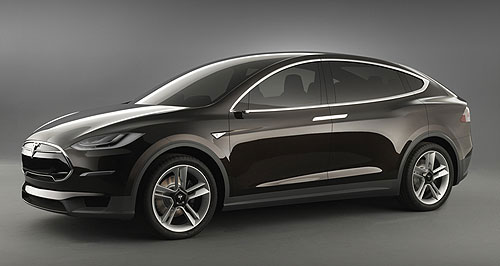News - TeslaTesla gives away its battery-powered brainsZero inhibitions: Tesla founder Elon Musk believes that giving away all his company’s patents will help other car-makers develop their own electric vehicle spin-offs. Philanthropic move sees Tesla co-founder Elon Musk reveal his tech advantage13 Jun 2014 By BARRY PARK US ELECTRIC car company Tesla has taken the unusual step of making all its patents available for anyone to see and use – for free. Tesla founder Elon Musk revealed overnight that the company, which launches the battery-powered Model S four-door hatchback in Australia next month, had removed restrictions on using all its patents “in the spirit of the open source movement” – a reference to the shared software community that has swept the computing world. Mr Musk said his move to release all the car-maker’s patents was for the advancement of electric vehicle technology. “Tesla Motors was created to accelerate the advent of sustainable transport. If we clear a path to the creation of compelling electric vehicles, but then lay intellectual property landmines behind us to inhibit others, we are acting in a manner contrary to that goal. “Tesla will not initiate patent lawsuits against anyone who, in good faith, wants to use our technology,” he said in a statement posted on the Tesla website. He said the patents held by Tesla were there to protect the car-maker when it was vulnerable to having its technology fall into the hands of bigger corporations. “At Tesla ... we felt compelled to create patents out of concern that the big car companies would copy our technology and then use their massive manufacturing, sales and marketing power to overwhelm Tesla,” Mr Musk said. “We couldn’t have been more wrong. The unfortunate reality is the opposite: electric car programs (or programs for any vehicle that doesn’t burn hydrocarbons) at the major manufacturers are small to non-existent, constituting an average of far less than one percent of their total vehicle sales. “At best, the large automakers are producing electric cars with limited range in limited volume. Some produce no zero emission cars at all. “Given that annual new vehicle production is approaching 100 million per year and the global fleet is approximately two billion cars, it is impossible for Tesla to build electric cars fast enough to address the carbon crisis. “By the same token, it means the market is enormous. Our true competition is not the small trickle of non-Tesla electric cars being produced, but rather the enormous flood of gasoline cars pouring out of the world’s factories every day. “We believe that Tesla, other companies making electric cars, and the world would all benefit from a common, rapidly-evolving technology platform.” Tesla’s bold move to bolster the introduction of battery-powered technology is not a first for the car-making industry. Mercedes-Benz holds a number of patents for safety features such as anti-lock brakes that it allows other car-makers to use in the interests of increasing the passive safety of vehicles worldwide. Last month, Ford said it would allow other car-makers to use its airbag-equipped seatbelt technology under licence for free. “Technology leadership is not defined by patents, which history has repeatedly shown to be small protection indeed against a determined competitor, but rather by the ability of a company to attract and motivate the world’s most talented engineers,” Mr Musk said. “We believe that applying the open source philosophy to our patents will strengthen rather than diminish Tesla’s position in this regard.” Electric car sales in Australia are expected to jump later this year as both the Tesla Model S and BMW’s i3 city-sized hatchback – which will also offer an optional petrol-powered range-extender – buoy interest in the vehicles. VFACTS data shows only 39 electric vehicles have sold to private buyers and 59 to businesses and government in Australia so far this year, representing only 0.02 percent of total vehicle sales in the first five months of this year. BMW’s i3 will start from $63,900 with an extra $6000 outlay for the range extender, while the Tesla Model S will start from $96,208 for a version of the hatchback that uses a smaller battery to give less range. Nissan’s Leaf city-sized hatchback, priced at $39,990 drive-away, is currently the only battery-powered car on the market, although Mitsubishi says it will still bring its $48,800 i-MiEV microcar featuring a battery-fuelled electric motor to Australia, but only if customers specifically ask for it.  Read more29th of May 2014  Tesla’s electric Model S slips under $100kLong-awaited Tesla Model S luxury EV gets $96k Australian starting price14th of April 2014  BMW seeks $10k break for EV, hybrid ownersLuxury car-maker BMW wants governments to get behind fuel-efficient technology |
Click to shareTesla articlesResearch Tesla Motor industry news |
















Facebook Twitter Instagram